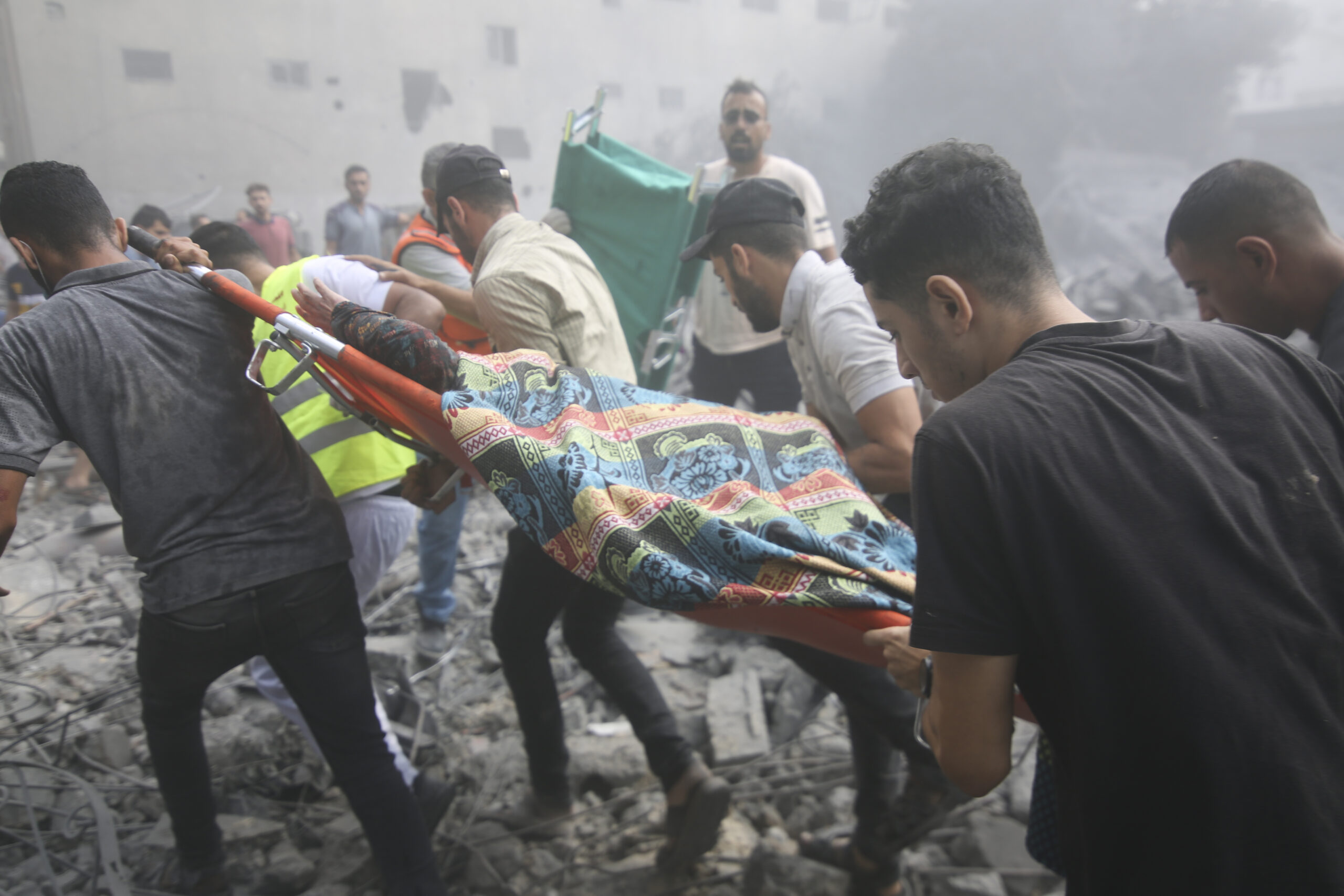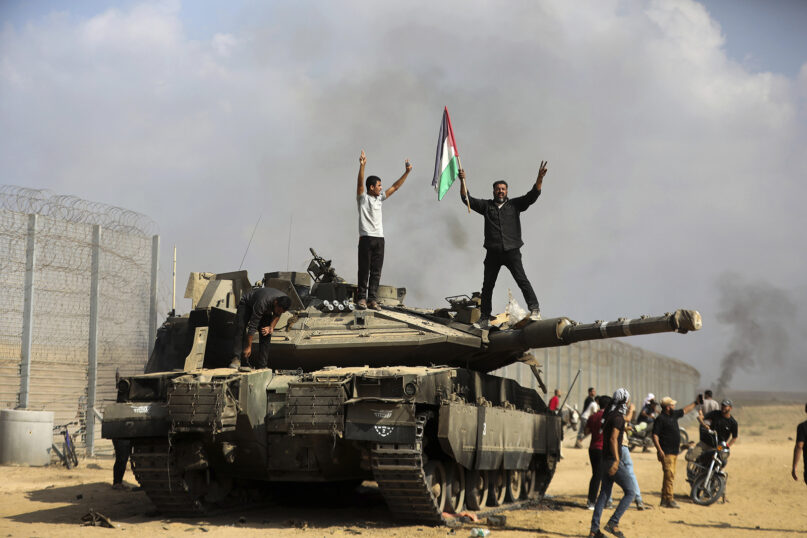(RNS) — Jer Swigart awoke in the Old City of Jerusalem on Saturday (Oct. 7) to the sound of bombs exploding and shattering glass, as Palestinian insurgents launched a historic surprise offensive against the Israeli occupation. The executive director of Global Immersion, an American faith-based non-profit that trains international peacemakers, Swigart, 43, has visited Israel-Palestine more than a dozen times to bear witness to the situation there and is no stranger to the disturbing sights and sounds of the Palestinian liberation struggle. “But this is unlike anything I’ve seen before,” he told RNS.
Since Palestinian forces’ astounding land, sea and air attack on Israel during the festival of Simchat Torah, hundreds on both sides have been killed and thousands wounded. The Palestinian militant group Hamas has reportedly abducted tourists, even Israeli soldiers. Hamas spokesperson Osama Hamdan insists that the group is not targeting civilians but those who live in “illegal settlements” and are thought to be complicit with Israeli armed forces because “they attacked Palestinians.”
Everyone, from Israeli movie actor Gal Gadot to President Joe Biden, has condemned the Palestinian insurgency. Even U.S. presidential candidate Cornel West, the man who wrote the foreword to the 60th Anniversary edition of Frantz Fanon’s treatise on armed struggle, “The Wretched of the Earth,” slammed the attack in a tweet, saying that “the ugly Palestinian retaliation results in the killing of precious innocent people on both sides.”
We’re right to be horrified by the tragic killing of innocents. But we must be careful not to call for a rejection of violence that leaves no true options for oppressed people to break free of domination. Nonviolent struggle is an actual method of embodied combat with proven strategies and tactics that must be deployed skillfully to work effectively.
Before the historic Birmingham Campaign of 1963, Black American pastors and leaders spent months preparing to descend upon America’s most segregated city like an army preparing for war: surveying the city’s geography, choosing targets and training civilians in restraint and how to perform nonviolent actions like sit-ins.
Sometimes called “war without weapons” by its most revered practitioners, nonviolent civil resistance aims to intentionally create crises that bring societies to a halt and force regimes to change.
However, that type of nonviolence has never been generally popular and is almost never what people are clamoring for online when they “condemn violence.” The overwhelming sentiment in popular culture that violence is never justifiable — even for the sake of liberation — has little to do with nonviolence as a transformative political force. Such rhetoric defangs the real tradition of nonviolence and civil resistance, turning a robust commitment to unarmed conflict into simplistic platitudes.
Organized, disruptive nonviolence is not what President Biden or Secretary of State Antony Blinken or anyone else who condemns the violence of Hamas’ attack are truly suggesting. Are they not really simply suggesting that the Palestinians respond to their plight with inaction?
Palestinians have no use for the venerated, thin ideal of nonviolence that solely exists in the hearts and newsfeeds of North Americans. They need an effective technique to disrupt the routine indignities of the Israeli occupation. Without a viable nonviolent strategy — and they have tried actual nonviolent action for decades — force is a predictable course of action.

Palestinians evacuate wounded after an Israeli airstrike in Rafah refugee camp, Southern Gaza Strip, Thursday, Oct. 12, 2023. (AP Photo/Hatem Ali)
When asked recently what most haunts him about his career as a former Israeli soldier, Ori Givati, of the advocacy organization Breaking the Silence, told Al Jazeera Plus, “For me, it’s the routine way we control the Palestinians,” before recounting the societal fact of the detainments, home invasions and a host of other acts of domination “to humiliate Palestinians on a daily basis.”
The dynamic that Givati describes sounds similar to Fanon’s description of the French occupation of Algeria, C.L.R. James’ account of Spain’s occupation of Haiti, or the tyranny of America’s slave system. In many cases like those, there were “violent” uprisings for self-determination.
Those uprisings were not careful. Based on witnessing struggles throughout the developing world, Fanon calls the violence of decolonial struggle “a program for total disorder.” James reveals the formerly enslaved “killed all” once they escaped Haitian plantations and “violated all the women who fell into their hands, often on their bleeding husbands … one of them carried a white child on a pike as a standard.” Most of the whites slain in Nat Turner’s rebellion were women and children.
These histories are testimonies to the ways oppressors create violent rebellions. We have no choice but to accept them as evidence of John F. Kennedy’s famous words: “Those who make nonviolent revolutions impossible, make violent revolutions inevitable.”
To make moral equivalences between the oppressors’ violence and the oppressed’s attempts to free themselves by force is dishonest. Hamas is guilty of war crimes, but the occupation created the conditions for the attack. Calls to nonviolence that place the moral imperative squarely on Palestinians unfairly paint the aggressed as the aggressor. They also confuse the question of how to respond to the violence of oppression.
Even Mahatma Gandhi, the paragon of nonviolence, once put forth that violence is the better choice when juxtaposed with inaction. “I would rather have India resort to arms in order to defend her honour than that she should, in a cowardly manner, become or remain a helpless witness to her own dishonor,” he wrote.
Elsewhere, Gandhi wrote: “I have been repeating over and over again that he who cannot protect himself or his nearest and dearest or their honour by non-violently facing death may and ought to do so by violently dealing with the oppressor.”
None of this means people should rush to take up arms, or that we should be numb to the innocents who will inevitably be killed. Even in traditional warfare, the best-case scenario is to find a way to resolve conflict without going to battle. Anyone prone to romanticize revolutionary violence should read Fanon’s discussion in “The Wretched of the Earth” of the deep psychological effects of the liberation struggle in Algeria on both the insurgent and colonial forces. Accounts like those remind us that war is always tragic.
It is, however, the last resort of marginalized people who were forced into a situation where they felt they had no choice but to meet force with force.
“I’m not happy about violence,” Swigart said, shaking his head, “but you get the feeling that this (uprising) is 75 years in the making. There’s this sense that they’re not going to take (Israeli domination) anymore — that they’ve escaped from their prison, and they’re like, ‘I’m either gonna be free or die, but I’m not going back in that cage.’”






